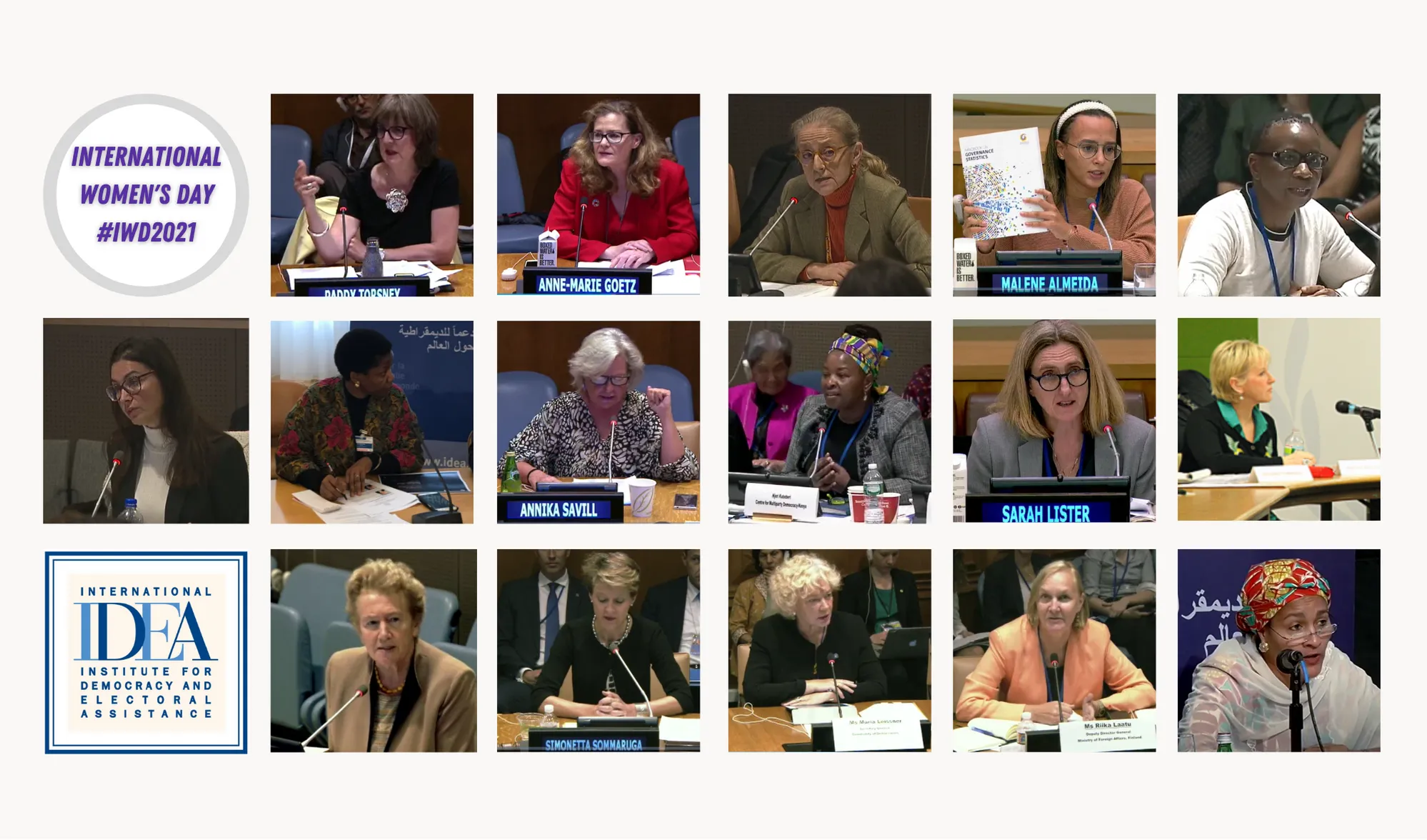Multilateral Action and Partnerships: Advancing Gender Equality and the Political Empowerment of Women as Common Goals

Women’s active participation and decision-making in public life are crucial to their empowerment and equality, and it is through democracy and multilateral action that these goals can be fully achieved. International Women’s Day reaffirms the engagement and political cooperation of supporting gender equality and promoting policies that advance women empowerment.
Disclaimer: Views expressed in this commentary are those of the authors. This commentary is independent of specific national or political interests. Views expressed do not necessarily represent the institutional position of International IDEA, its Board of Advisers or its Council of Member States.
Democracy, gender equality and women empowerment are intrinsically connected and intertwined, as democracy needs gender equality to be truly democratic and fair, and women need democracy and civic engagement to be an active agent of change while safeguarding women’s rights.
Gender equality is also instrumental to ensure sustainable development, which is why SDG 5 (Gender Equality) and SDG 16 (Peace, Justice and Strong Institutions) are dedicated to the advancement of women’s empowerment and inclusion through their targets, as well as to uphold women’s and girls’ rights, including to end all forms of discrimination against all women and girls everywhere; and to ensure responsive, inclusive, participatory and representative decision-making at all levels.
When we discuss the concept of "democracy", we cannot separate it from the notion of "gender equality". A true and just democracy must be inclusive and equal, which requires women’s participation and representation. Gender inequality is created and perpetuated by power imbalances in our democratic institutions and relations, which lead to unfair representation, lack of decision-making, and structural barriers to the participation of women. Only by mutating this unequal power and granting a fair say to women—increasing their participation, leadership and decision-making in politics—it is possible to advance policies that favor gender equality and democracy.
Democracy is a fundamental value of the United Nations, which is why women’s rights and equality are also at the very core of the UN’s purpose. The advance of democracy and human rights protection cannot exclude the defense of women’s rights. The UN supports democracy by promoting human rights, development, peace and security. Additionally, the UN strongly supports women's political participation, and is actively engaged in promoting polices and legislative change at the local and global levels to support women’s political participation, leadership, and protection of women’s rights. International IDEA’s key partners in promoting and enabling gender equality are the United Nations Programme for Development (UNDP) and UN Women, with whom joint initiatives have been developed at the local, national, regional and global levels to underscore the interlinkages between democracy, peace, development, human rights and gender equality.
While many efforts have taken place over the past 75 years of the United Nations to promote women’s rights and narrow the inequality gap, the progress has been slow and at times disjointed. Particularly in some parts of the world, women are still discriminated against, suffer victimization and violence, and are excluded from power positions and decision-making processes. Women are too often poorly represented in political decision-making bodies, and their rights are often seen as negotiable and peripheral. The recent Covid-19 crisis has additionally exacerbated many of those underlying inequalities, as it has been utterly more devastating for women rather than men across the world—corroding away years of gender equality progress and women’s rights battles—as shown, for example, by the increase of domestic violence during lockdown, or the overwhelming impact of unemployment on women because of the economic downturn brought about by the pandemic crisis.
That is why the United Nations, together with key partners, need to do more—and better—now more than ever. And that is why multilateral collaboration is crucial and international organizations such as International IDEA, with its mandate on democracy and electoral processes, are crucial partners that play a fundamental role in reversing the trend of gender inequality and advocating for women.
International IDEA, through its Inter-Regional Dialogue on Democracy (IRDD), together with the Community of Democracies and UNDP, published the Inter-Regional Report on Regional Organizations, Gender Equality and the Political Empowerment of Women. The document summarizes policy recommendation by key global and regional multilateral organizations, as well civil society organizations, government officials and experts in the field, that gathered to discuss the main challenges and opportunities around this relevant theme. Today, these recommendations are instrumental to continue advancing women, and achieve inclusive societies worldwide.
According to the results of a series of regional consultations on Gender Equality and Political Empowerment of Women, that were the basis for the Report, women continue to face key challenges as they are increasingly aspiring to a more engaging participation in public life:
- Women have less access to financial resources to consolidate themselves as political leaders.
- Women are assigned disadvantageous positions on internal listings within their political parties.
- The assumption is that women’s personal life will not allow them to engage in political processes.
- There are less capacity-building opportunities for women, and this results in their incapacity to access the necessary tools to succeed, despite their full intention to participate and engage in political life.
- Elected women are bullied and pressured by their peers, which results in physical and psychological violence, increasing the level of desertion of incumbent women elected for public office.
- Women that are in power and remain in office are often influenced by a man who exercises power through them.
Gender Equality is at the core of International IDEA’s commitment to democracy building, because it is only through inclusive and equal institutions and processes that it is possible to achieve long-lasting equality between men and women, as well as equal powers and decision-making opportunities.
International IDEA’s work on Gender Equality and Women’s Empowerment is reflected in the detailed research, data collection and policy-relevant analysis produced by the organization. An example of that is its work on the Covid-19 Global Monitor, funded by the European Commission, which is a powerful tool to hold governments accountable and track the effects of the pandemic on democracy and human rights. The Global Monitor is a platform that allows public access to knowledge, information, and policy guidance on democracy and the recent Covid-19 crisis, including the effects of restrictive measures used by governments around the word to contain the pandemic.
Women’s rights have been undeniably affected by the crisis, and the Global Monitor offers a detailed informative look into the tangible consequences of that. Unsurprisingly, there has been a wide range of human rights violations around the world, accentuating pre-existing inequalities and injustice. The Covid-19 pandemic has been a vehicle—in authoritarian countries, but also elsewhere—of repressive measures against opposition or religious voices, as well as ethnic or sexual minorities. That includes violence against women and increased gender inequality, because of isolation and economic discrimination for the former, and constraints in democratic institutions, inclusiveness, and civic society participation, for the latter. Most caregivers, at home and in our communities, are women, and they are the ones who have been in the frontline of the recent pandemic. Additionally, women’s health has been put in danger by limiting the access to sexual and reproductive health services. As people have been locked down in their homes, we have realized how “homes” are not always a safe place for many women and girls who are victims of domestic violence.
In celebration of the International Women’s Day, all citizens, the international community, and global and national leaders, are invited to recognize that a more rapid advancement of gender equality is needed, and to renew their commitment to concrete actions to achieve the common goal of enabling the path towards fully inclusive and just societies.
We, at International IDEA, following the Mission entrusted to us by our Member States to promote and support democracy worldwide, and fostering institutional partnerships, reaffirm our commitment to develop knowledge and tools, and to serve as a vehicle to facilitate dialogues that result in more and better opportunities to empower women based on high quality disaggregated data, and the best available tools to achieve SDG 5 and SDG 16 by 2030.
We are pleased to join the commemoration of this year’s International Women’s Day.




